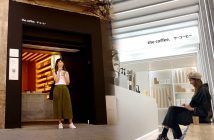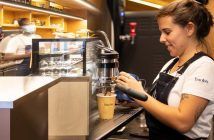The school success has a lot to do with immigrant Brazilians, who make up over 60% of students
When one says that there are Brazilians everywhere of the world, do not doubt it. Especially in Portugal, with the ease of language, there are thousands of them, mostly trying to find their place under the sun. And, with an eye on the growth of the specialty coffee market back home, Brazilians in tune with what is going on have been trying to enrich their curriculum. Proof of this is the success of Abcoffee, Porto’s first specialty coffee school, opened just a year ago, which promotes several courses, all certified by SCA.
Due to their friendship, Hugo Ferraz, chief barista and one of the partners of the Chá das Cinco coffee shop and Diogo Amorim, founder and roaster of Senzu Coffee Roasters, have teamed up to create the school thanks to the growing demand for specialty coffees in Porto. “Diogo was the one who orchestrated all this much more than me, as the idea was his. On my end, I just complained about the lack of qualified professionals,” confides Hugo. In order to create the school, they have taken several courses in Europe, in Copenhagen, Milan and Switzerland, and brought a synthesis of the best of the Porto school.
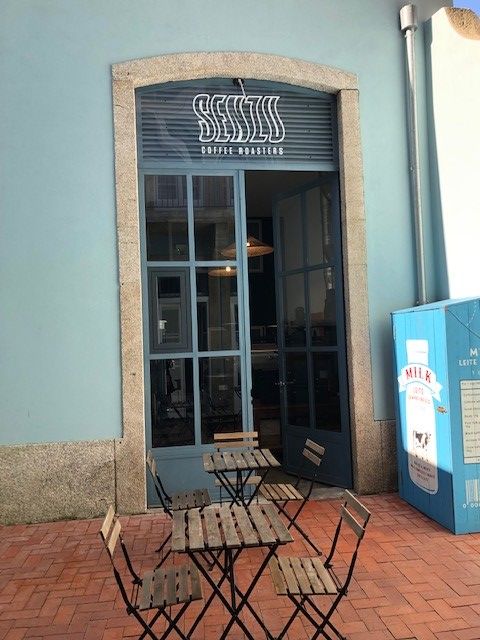
Attending SCA Requirements
But it was just last year, with new cafes popping up and the number of tourists from other capital cities in Europe increasing, that they decided to invest nearly 100,000 euros to set up the school according to SCA requirements. “Here, we have a room fully prepared for theory and practice, with three benches equipped with espresso machines, so that future professionals can get their hands dirty. At the back of this room is a one-kilogram roaster, by Portuguese manufacturer, Joper, all white, an unusual color for a machine of this nature. “We wanted people to understand straight away that this is a school, thereby our requirement for the predominant color of the site to be white,” says Hugo.
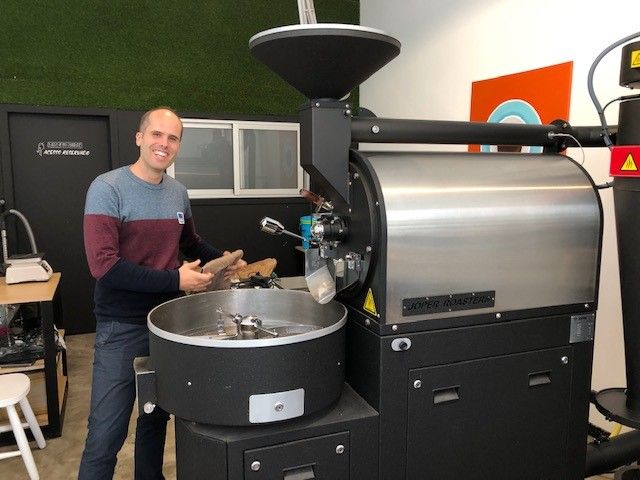
Added to that is the laboratory area, which is required by SCA, where it is possible to darken the environment almost completely and analyze the beans by means of a special light, which makes it possible to see most of the flaws in a coffee bean. “Here, we also do the cuppings, as they should be done: without identification, so that we can, together with the students, analyze the coffees without any prejudice,” he comments.
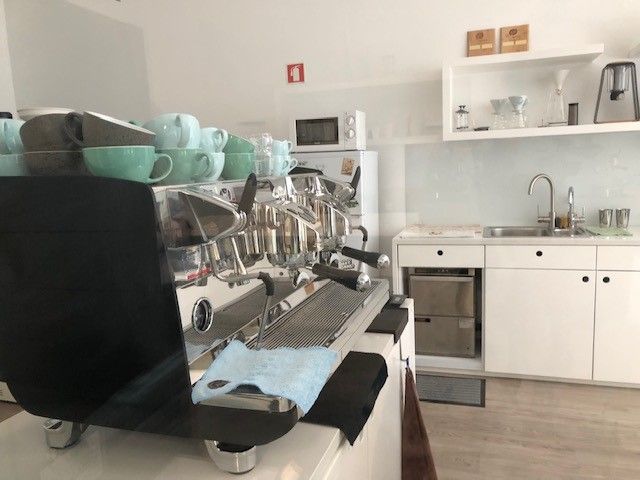
“We are an SCA Premium Campus and all the courses we teach, introduction to coffee, green coffee, sensory analysis, barista, brewing and roasting meet the association’s requirements,” he says.
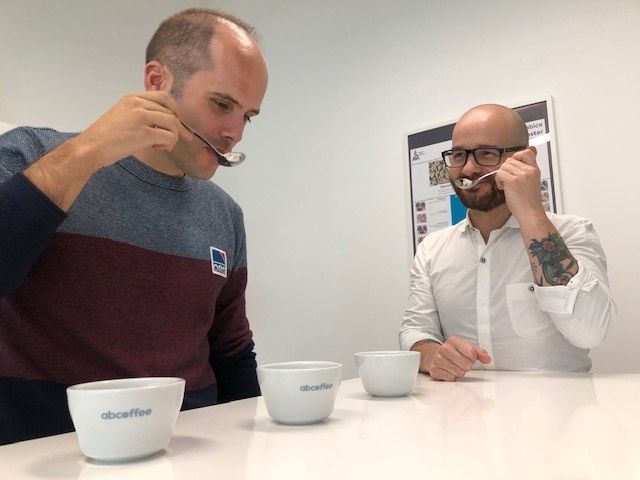
As a professional barista, Hugo is responsible for teaching the barista and brewing courses, as he has a certified training in Latte Art and ranked third in the 2019 National Barista Championship.
Diogo, who also holds a degree in coffee economics and science from the University of Triestre in Italy, teaches green coffee, sensory analysis and roasting.
Workshops
Besides the vocational courses, Abcoffee also promotes a series of workshops, short courses, two hours, on average, with more affordable prices. Included in the curriculum is the tea preparation course. “As I work in a coffee shop that works with high quality teas, I realized that there was a demand for this course, thanks to the fact that the Portuguese history is intertwined with the introduction of teas in Europe,” says Hugo. (read the story on Camelia Chás)
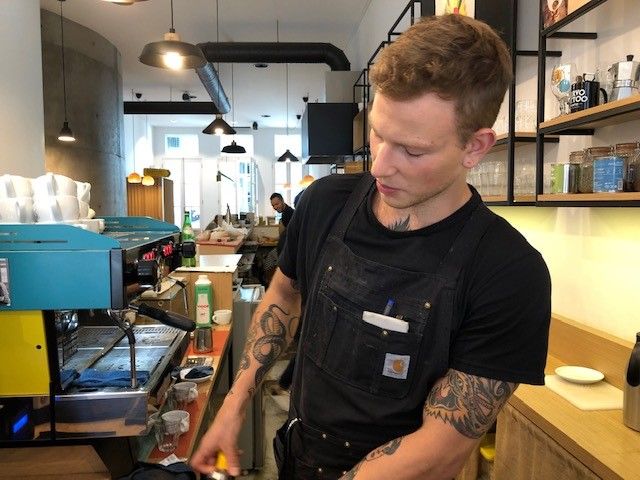
“As a school, we have the duty of explaining to people that there are more interesting alternatives to drinking coffee, besides espresso, which is the best seller in Portugal. There is practically no strained coffee around here, and we want to reverse that,” he says.
The specialty coffee market in Porto
Despite the growing interest in specialty coffees, the market is still restricted. “We are fighting against a culture based on drinking the bad espresso, which is wrongly drunk, but costs less than one euro. For a specialty cup of coffee, you will not spend less than 1.5 euros. It is quite a considerable difference and the average Portuguese still can’t recognize the difference in quality. This is the primary role of the school, that is, slowly teaching consumers to perceive the differences. Only then will they require a better product,” says Diogo. Add to that the fact that Portugal still has the lowest minimum wage in Europe, around 650 euros per month, against 1,480 euros in France, for example.
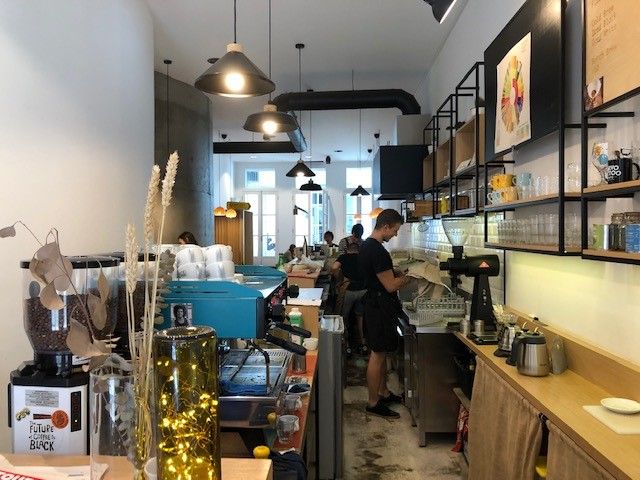
Moreover, the flood of foreign tourists in recent times has helped the growth of consumption of high quality coffees in Porto. “It is much easier to sell specialty coffees to anyone who has heard of them or already consumes better products in their home countries. Our internal market alone does not justify so much investment,” explains Diogo.
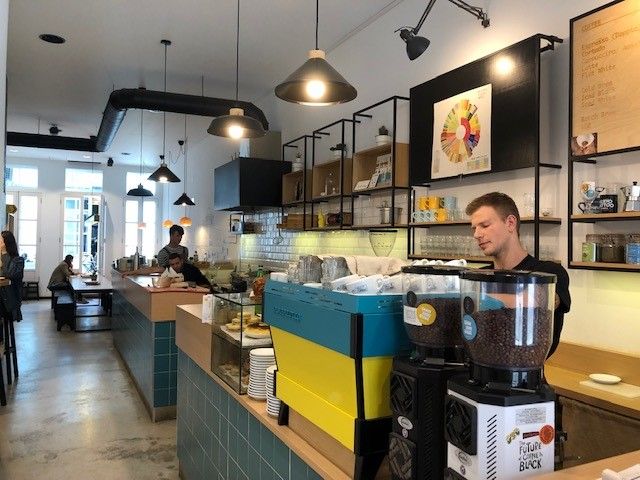
The guys recommend only seven coffee shops in town that actually work with specialty coffees, which are 7groasters, Bird of Passage, Chá das Cinco, Mesa 325, C ‘alma Coffee Shop, Combi and Fábrica Coffee Roasters. “These, we guarantee, will provide their customers with the best roasted beans, in order to extract the best of coffee”, they say in unison.
Chá das Cinco
In 2017, Hugo Ferraz, a barista and former video editor, and his fiancée, Sofia Lemos da Costa, a training designer who discovered her true vocation by studying the science of patisserie in Italy, decided to open the Chá das Cinco Coffee Shop.
Naturally, Hugo takes care of curating and preparing specialty coffees and teas, provided by the Portuguese Tea Company and Camelia Chás. And Sofia creates new recipes for cakes, savory and sweet, red velvet, apple donuts, chocolate pie and port wine, among other delights, which incidentally provides for several other establishments in the city. However, don’t expect to eat Belem pastries in the house. “The catch here are the cakes with American pasta, but the ingredients used are Portuguese, as are the furniture of the 70’s.
Hugo takes the opportunity to put into practice everything he recommends at Abcoffee. “In my coffee shop, I always invite customers to try strained coffees in a variety of methods, such as Chemex, Aeropress, V60. This is because it is good to remember that having a cup of coffee for us means just consuming espresso, and a low quality one. This trend needs to be reversed,” he emphasizes.
The specialty coffees served always vary. One of the last was one from Ethiopia, with notes of peach, lime and chocolate. Ah, but don’t expect to find Brazilian coffees there. Sofia does not like them, despite Hugo’s appeals. “To this day, the best coffee we serve in the house was one of by Isto É Café, from a Fortaleza Environmental Farm,” he recalls.
Chá das Cinco
www.chadascinco.pt
Address: Praça da Alegria, 63 (Bonfim), Porto
Bird of Passage
Bird of Passage, as the name implies, is a migratory bird, but it can also apply to a person who passes by various locations without spending much time anywhere. The owner of Bird of Passage is Paolo Guffens himself who, despite the Italian name, was born in Antwerp, but has lived in Australia, New Zealand, South Africa, Uruguay, Canada, London and now Porto.
On the day we visited the coffee shop, unfortunately, he was not there, which, considering his profile, is not surprising. But the truth is that it was just our bad luck, because it seems that he found in Porto his place in the world.
Paolo has been working with specialty coffees since 2011 and is passionate about what he does. He also favors artisanal bread and beer, olive oil, tea and everything related to quality. Perhaps, it is the most globalized cafeteria in Porto, since its collaborators are Croatian, Polish, Brazilian and Portuguese.
The house is modern, bright and spacious, and even has a small garden at the back of the cafeteria for sunny days. The coffees are roasted by Senzu, by Diogo Amorim, also from Abcoffee. Senzu even occupies a room at the back, which houses the Joper Roaster and green coffees from around the world. There, Diogo roasts, on average about 100 kg per month and considers himself a nano roaster. His menu currently includes coffees from Honduras, Myanmar, Ethiopia, El Salvador and Peru.
Although he has already come to Brazil four times to visit his family who lives in Rio, Diogo cannot find the specialty Brazilian coffees in Porto. “Traders think I have something against the country and its coffees. On the contrary, I love them both. The problem is the prejudice that specialty coffee still suffers in Europe, as many people still think they are monotonous coffees. And that means I can’t sell them to my clients. I often bought great coffees and was forced to make blends, so that they didn’t get stuck,” he concludes.
Bird of Passage
www.birdofpassagecoffee.com and Senzu Coffee Roasters www.senzucoffee.com.
Rua do Duque de Loulé, 185, Porto
Mesa 325
Mesa 325 It was the first specialty coffee shop in Porto, opened about five years ago, by the couple Mario and Leonor Espinha. His inspiration was the coffee shops from several other European capitals, especially London. The coffees served here are roasted by Frederico Silva’s Vernazza, created in 2015.
As they are not located in the tourist area, but in Bonfim, they stood out thanks to the excellent service and quality food, since, as here, no one gets rich by selling cups of coffee. Food is what really pays the bills!
At Mesa 325, the menu starts with soups, salads, dishes and desserts. The decoration is fairly pleasant and one can spend a couple of hours there tasting Kenyan coffees brewed in a V60 or a Colombian grain, filtered by Chemex. The espresso is also very well taken. They also serve craft beers.
Mesa 325
Avenida São Camilo, 91, Bonfim
Fábrica Coffee Roasters
Fábrica It is actually a coffee shop and roaster in Lisbon, where it opened its doors in 2015. Last year, they got in Porto. The site houses a beautiful garden, from where you can sample specialty coffees from Kenya, Colombia, Guatemala, Ethiopia and Brazil that can be sampled in various methods. They currently have three more locations in Lisbon.
They buy directly from producers in these countries and, in the specific case of Brazilian specialty coffees, use them both as single origin and blends.
Fábrica is located at Rua José Falcão, 122, Baixa
www.fabricacoffeeroasters.com

